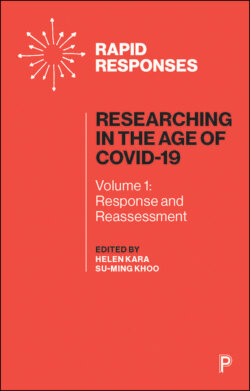Читать книгу Researching in the Age of COVID-19 Vol 1 - Группа авторов - Страница 14
На сайте Литреса книга снята с продажи.
Factors that influence refusal rates: audio audits
ОглавлениеThe quality of the data collected using phone surveys is often questioned. Data collection interfaces offer audio audits (audio recordings of surveys) as a quality control measure. However, anecdotal evidence suggests that audio audits decrease survey participation rates, as research protocols require respondents to be informed prior to the survey that their responses are being recorded. In one of the host studies, one-third of the respondents’ responses were randomly allocated to be recorded and, for the remaining two-thirds, a manual back-check (a secondary quality control call, conducted a few days after survey completion) was administered. The results are presented in Table 1.5.
Table 1.5 Impact of audio audits on survey refusal rates
| Refusal (‘Yes’ = 1) | (1) | (2) | (3) |
| OLS | FE | FE | |
| Audio audit (1 = ‘Yes’) | 0.0137 | 0.0174 | 0.0235** |
| (0.0110) | (0.0107) | (0.0107) | |
| Constant | 0.125*** | 0.124*** | 0.122*** |
| (0.00539) | (0.00526) | (0.00520) | |
| Observations | 5,083 | 5,083 | 5,083 |
| R-squared | 0.000 | 0.038 | 0.056 |
| State FE | Yes | Yes | |
| Enumerator FE | Yes |
Notes:
Robust standard errors in parentheses. *** p < 0.01; ** p < 0.05; * p < 0.1.
The dependent variable for all the three models presented in Table 1.5 is “Refused to participate in the survey” (1 = refused, 0 = not refused). The results show that introducing audio audits marginally increases the refusal rate by 2.3 per cent (significant at p = 0.05 levels) with state and enumerator fixed effects. The findings also point to large enumerator effects, indicating that how a survey is introduced to respondents determines whether they choose to participate in the survey.
